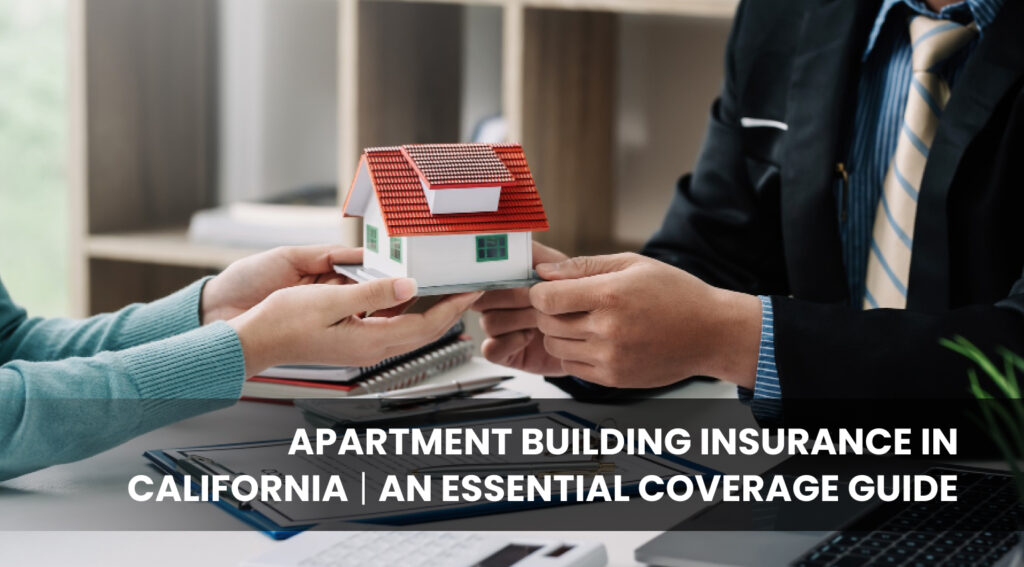
Apartment Building Insurance in California | An Essential Coverage Guide
Owning or managing an apartment building in California is both a financial opportunity and a serious responsibility. From earthquakes and wildfires to liability claims and tenant damage, countless risks can threaten your investment.
That is why having proper Apartment Building Insurance in California is not just smart; it is required for legal and financial protection.
This guide explains the key coverages, California-specific insurance requirements, and expert tips to help property owners make informed decisions.
Understanding Apartment Building Insurance
Apartment Building Insurance, also known as landlord or property insurance, protects multi-unit residential buildings against property damage, liability claims, and loss of rental income. It is specifically designed for building owners who rent out units rather than occupy them.
This insurance plays a vital role in safeguarding both the structure and your financial interests if an unexpected event occurs, such as fire, water damage, vandalism, or natural disasters.
What Does Apartment Building Insurance in California Cover?
California’s unique geography and climate demand broad insurance protection. Standard policies can be customized to include optional endorsements that address regional risks like wildfires and earthquakes.
Below is a summary of common types of coverage:
| Coverage Type | What It Covers |
| Property Coverage | Protects the building structure, roofs, walls, and permanent fixtures from fire, storms, or vandalism. |
| Liability Coverage | Covers legal and medical costs if a tenant, visitor, or contractor is injured on the property. |
| Loss of Rental Income | Reimburses lost income if tenants must vacate during covered repairs. |
| Equipment Breakdown | Covers repairs or replacement of essential systems such as elevators, HVAC units, or boilers. |
| Workers’ Compensation | Required if you employ maintenance or security staff; covers job-related injuries. |
| Earthquake and Flood Insurance | Usually optional but strongly advised in California due to seismic and flood risks. |
California Legal and Regulatory Compliance
In order to stay in compliance with California state law, apartment owners must follow stringent insurance and safety requirements.
1. Minimum Coverage Requirements
California Civil Code §1940–§1954 outlines landlord responsibilities, including maintaining habitable premises. Insurance is not optional when required by mortgage lenders or city housing departments.
2. Fair Housing Compliance
Insurance policies cannot discriminate against or exclude tenants based on race, disability, or other protected categories under the California Fair Employment and Housing Act (FEHA).
3. Earthquake and Wildfire Disclosures
California property owners must disclose seismic and fire zone status to tenants and lenders. While earthquake coverage is not legally mandatory, it is strongly encouraged under the California Earthquake Authority (CEA) guidelines.
4. Liability and Tenant Protection
Property owners are legally responsible for maintaining safe living conditions. Inadequate insurance coverage can result in heavy penalties or lawsuits if negligence leads to injury or property loss.
Why Apartment Building Insurance Is Crucial in California
California faces more natural and environmental risks than most other states. Earthquakes, wildfires, and flooding are all common causes of property loss. Without adequate insurance, rebuilding or repairing damages can quickly drain your finances.
Moreover, liability claims can be devastating for landlords. A single injury lawsuit could cost hundreds of thousands of dollars if not properly insured. Apartment building insurance ensures compliance with California’s legal framework while protecting your financial stability.
Expert Tips for Apartment Owners
- Review Your Policy Annually: California’s insurance market is highly dynamic due to evolving climate risks. Regular policy reviews keep coverage up-to-date.
- Document Property Condition: Maintain inspection reports and photos to strengthen your claim documentation.
- Consider Earthquake Coverage: Many insurers offer separate earthquake policies through the CEA.
- Work with Licensed Brokers: Always use an agent licensed under the California Department of Insurance (CDI) to ensure your policy meets state standards.
- Bundle Policies: Combining property, liability, and business interruption coverages often reduces overall premiums.
Wrap Up
Protecting your apartment building in California requires more than just meeting legal obligations. It means securing your livelihood. Comprehensive Apartment Building Insurance in California shields your property, income, and reputation from potential disasters.
With the right policy, you can navigate California’s challenging insurance environment confidently, knowing your investment and tenants are protected.
To get a free quote, connect with a reputable insurance service provider.
